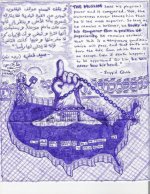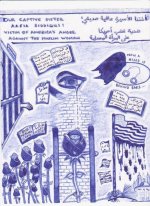Abu Umar: “He enjoyed hearing my screams”
Exclusive testimony of ‘Abu Umar‘ from the CagePrisoners Saudi Torture Project.
Background
Praise be to Allah and peace and blessings be on the Messenger Muhammad.
My name is Abu Umar. I was resident in Saudi Arabia lawfully and did not contravene any law of the country. I was arrested in the Prophet’s city Madinah by the Mabahith Security Service of Saudi Arabia in 2007 without reason.
Torture
I was arrested arbitrarily, through deception. I was arrested without being shown the identity of those arresting me and without being shown an arrest warrant. As soon as I was arrested I asked to be allowed to appoint a lawyer but they did not allow me to do that. On being detained I was placed in an old solitary confinement cell similar to a dungeon. I spent a few weeks there before being moved to another solitary confinement cell that was located beneath the ground. I remained in these isolation cells for approximately four months. I was not provided with even my basic rights; sanitary necessities, enough clothes and neither had I seen the sunshine during this period.
During my time in solitary confinement I was being interrogated day and night and tortured in various ways.
I was interrogated during this period by of four interrogators. I came to know their names later. There are other interrogators the names of whom I do not know:
1. Lt. Yusuf al-Barakaty
2. Lt. Bandar al-Hazmi
3. Captain Ghazi al-Husseini al-‘Awfi
4. Major Bakr al-‘Awfi
Note that Yusuf al-Barakaty is the individual pictured at the head of this statement. I am able to confirm that he is the interrogator I refer to Yusuf al-Barakaty.
During the interrogation sessions which lasted for more than 5 years I was exposed to various kinds of physical and psychological torture, especially during the first four months of my detention. I am able to confirm the names of two interrogators who in particular participated in torturing me physically; Yusuf al-Barakaty and Ghazi al-‘Awfi. There were others on whose hands I was tortured, but I do not know their names.
I will mention below what interrogators did with me;
What (Ghazi al-Husseini al-‘Awfi) did:
First: He left me without sufficient clothes. Clothing is provided on orders of the interrogator in charge of the case Ghazi al-‘Awfi was primarily responsible for interrogating me and it was he who ordered that I should be deprived of clothing and he in doing this robbed me of the simplest of my rights. This continued for a period of four months. I did not have enough clothes and was left in this condition throughout the severely cold winter months.
Second: Summoning for interrogation at random times at deliberately irregular intervals to cause mental and physical fatigue. At times I was taken from my sleep for interrogation in the middle of the night.
Third: The interrogator Ghazi al-‘Awfi ordered the military guards to stand me against the wall while I was blindfolded, handcuffed and bound in leg irons, for long periods of time; up to six consecutive hours. He was threatening to beat me severely if I tried to sit or move from where I was or did not follow his orders. My feet were swollen from periods of forced standing.
Fourth: he hung me by my hands with a chain fixed to a high place such that only the toes of my feet would touch the ground. He left me in this position for long periods of time and for a number of hours.
Fifth: He beat me with the following tools of torture:
1. Baton (also known in Arabic as ‘Khaizrana’). (This is well known tool in the Middle East specifically made for torture.) It is approximately 1.2 meters long and approximately 2 cm wide. It is round and light brown in colour. He beat me with this baton at full strength on my hands until they swelled and on my back. The bruises from this torture would remain on my body for long periods of time ranging from days to weeks.
2. Hose, similar to a water hose; Ghazi Al Awfi repeatedly beat me with this tool on a number of occasions. I was laid face down on the ground, with my eyes blindfolded, my hand and feet shackled. I am unable to describe the tool in further detail because I have not seen it, but I remember that the beating was very severe. I would scream in pain however he did not have any mercy and instead increased the beating because he enjoyed hearing my screams.
Sixth: Depriving me of sleep and at times allowing me very minute amounts of sleep. He would summon me for interrogation in the day and at night. Each interrogation lasted for several hours and often I was forced to stand during the sessions. When I was returned to my cell I could not sleep except very minute amounts. The sounds made by the military guards were very disturbing. This continued for a period of fifteen days and I became extremely exhausted both mentally and physically. I began to utter inappropriate words due to losing my senses.
Seventh: Ghazi al-‘Awfi always insulted me and treated me in the most degrading way. He would verbally abuse me and utter obscenities like ‘Oh bull’ and other terms which I do not remember.
What Yusuf al-Barakaty did:
First: He summoned me for interrogation day and night in a random manner without any predictable routine with the aim of causing me mental and physical fatigue. He did this at least 30 times or more.
Second: Yusuf al-Barakaty beat me without the use of any particular instruments; by using his hand and striking me with maximum strength on my back and my neck whilst screaming in my face “I am teaching you manners” and “I am rectifying your attitude”. He, al-Barakaty, then made me stand facing the wall with my eyes blindfolded and any hands and feet shackled for two hours. I remember very well that he would often enter the interrogation room while I was being tortured and would find it entertaining to stand and watch me being tortured. He would join in by hurling degrading verbal abuse in the worst forms at me. This occurred a number of times.
The first few months were the harshest times of my life. It was then that most of torture took place, those were dark days. On being returned to my cell following interrogation sessions I would find wounds on my body and my clothes would be stained with my own blood. During those months I was in a very bad psychological state. After being returned from interrogation sessions I would find pains in the places where I was beaten; for example in my stomach, in my thighs, legs, hands, fingers and even fingertips. I developed a phobia of interrogation and the interrogation officers. Whenever I came back to my cell my constant worry would be about when the next interrogation session might be. Not knowing when it would be caused enormous psychological distress and increased the effect and severity of my phobia of the interrogation sessions and the interrogator. I find it impossible to describe that period justly and words can hardly express those feelings.
I was cut off completely from the outside world. I was not allowed to contact my family, my sick mother or my pregnant wife. I was not allowed to appoint a lawyer to defend me legally or allowed to request my rights. I felt I was between life and death, and I was wishing that I had been dead and forgotten long before that time, than to have been subject to all this. I was either in a cell where no one could listen to me or I was in an interrogation room where it was even worse; I would scream, cry and shout in pain and agony but no one would have mercy, instead they would continue torturing me even more because they were beasts who found pleasure in that.
They prevented me from contacting my family for six months and I did not seen my family for the duration of my detention which lasted more than five years, except on approximately four occasions. I only saw my sick mother once during these years. I would not wish for anyone to go through such an ordeal. Whenever I remember it, it only increases my grief and sorrow.
It is worth noting here that I was not produced before any Court or charged with any offence throughout that period and I was not allowed to instruct a lawyer as stipulated in their code of procedure. The following are injuries and damages I suffered due to my detention:
Physical and psychological damage:
1. Severe pain due to severe physical torture
2. Deterioration of muscle due to forced inactivity resulting in lack of exercise over the years.
3. Deficiency in the level of vitamins due to a lack of adequate exposure to sunlight and poor nutrition throughout the years.
4. Irritable bowel syndrome
5. Weight loss due to malnutrition
6. Intense fear of the future and being constantly preoccupied with it.
7. Remaining very distant from the upbringing of my son throughout all these years, and him being brought up as a orphan without a father.
Material loss:
1. Huge material losses due to a complete halting of all business activities throughout the years.
2. The accumulation of debt as I am the only breadwinner for my family and I did not have a source of income during those years.
3. The loss of my property because my sudden disappearance from society.
4. Failure to return my possessions which had been confiscated when I was detained by the Mabahith in Saudi Arabia.
I was released in 2012. I was not compensated for the losses I incurred. I was not tried nor was I given any official or unofficial document explaining the reasons for my detention.
I ask everyone who reads this testimony to assist in taking legal action on behalf of the prisoners particularly those who were tortured at the hands of the mentioned interrogators. Indeed the majority of prisoners who were imprisoned at the Madinah Mabahith Detention Centre will have been tortured by the said interrogators. Those who are not able to do that may forward this to anyone who is able to raise complaints against these criminals. I also advise anyone who has suffered like myself not to remain silent and to raise complaints against their interrogators and to try and obtain arrest warrants against them via, for example, the international police – Interpol.
Written by Abu Umar
28/01/2013

 is not ignorant. He
is not ignorant. He 
